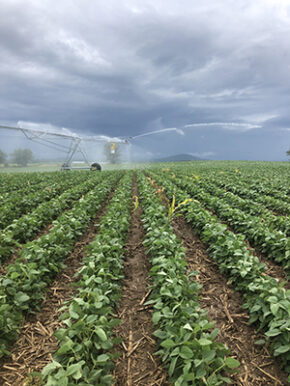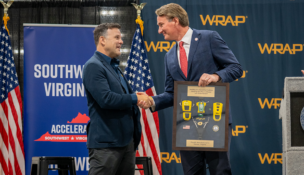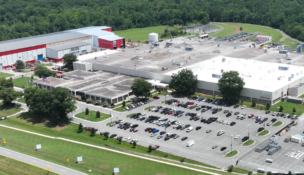The soybean dilemma
Va. soybean exports to China plunged under Trump; would Biden do better?
Kate Andrews //October 8, 2020//
The soybean dilemma
Va. soybean exports to China plunged under Trump; would Biden do better?
Kate Andrews //October 8, 2020//
One thing’s for certain: The one-two punch of the U.S.-China tariffs battle followed by the coronavirus pandemic has hurt farmers in Virginia. But opinions are divided on the future of agriculture and forestry in the commonwealth, and which presidential candidate has better policies to protect jobs and profits here.
On the side of Democratic nominee Joe Biden is former Gov. Terry McAuliffe, one of the former vice president’s chief surrogates in Virginia. Calling President Donald Trump “an existential threat” to the nation, McAuliffe blames the president’s “ridiculous trade wars” for hurting Virginia, which saw agricultural exports to China fall from nearly $700 million in 2016 to just $235 million in 2018, he said, citing statistics from the Virginia Department of Agriculture and Consumer Services.
Agriculture and forestry, which make up about $91 billion of the state’s economic impact, are the industries most vulnerable to losing income under Trump’s policies, McAuliffe said.
VDACS spokesman Michael Wallace noted that Virginia’s trade situation with China has been “volatile, with agricultural purchases from Virginia slowing and partially rebounding as trade negotiations with the U.S. wax and wane.” The tariff battle is definitely a factor since 2018, he adds, but so has African Swine Fever, which “decimated” China’s pork production, decreasing it by more than 33%. In 2019, total Virginia exports to China were at $394 million, aided by more than $180 million in pork shipments, and from January through August 2020, the total was reported at $387 million, including $248 million in pork exports.
Virginia’s soybean exports to China also have fluctuated a great deal over the past three years, ranging from $360 million in 2017 and $58 million in 2018 to $109 million in 2019. But for the first six months of 2020, soybean exports to China from Virginia brought in just $300,000, down from $18 million in the same period of 2019, Wallace said. Although U.S. soybean sales to China rebounded in July and August, the same cannot be said for Virginia’s soybean exports. According to Wallace, the bulk of U.S. soybean exports came from the Midwest and were shipped out of New Orleans.
“It is difficult to predict or give projections regarding growth in trade with China, given the uncertainties of where things stand relative to the ‘Phase One’ agreement and the associated commitments,” Wallace said.
It is “critical for Virginia” that Biden win the presidential election, McAuliffe said, adding, “Our farmers [and] our exporters cannot stand another four years of Donald Trump.”
However, as one would expect, Trump’s camp argues the opposite. “Virginia’s farmers and manufacturers are reaping the benefits of a level playing field, thanks to President Trump’s work to renegotiate unfair trade deals that shipped jobs overseas,” Trump campaign spokesperson Samantha Cotten said in a statement. “President Trump continues to put American workers first and has delivered on his promises by securing the USMCA and Phase One of a trade deal with China. Meanwhile, Joe Biden wants to hike taxes and give the upper hand to foreign countries with disastrous policies, which will kill jobs across the commonwealth.”
According to U.S. Census data released in September, the nation’s trade gap was at $63.6 billion in July, the highest rate in 12 years, with China responsible for almost half of it — although the Chinese deficit was lower than before. Currently, the U.S. levies 7.5% tariffs on $120 billion in certain Chinese goods and 25% taxes on about $250 billion of Chinese products. Biden has said he will “insist on fair trade” with the Chinese, and his “Made in All of America” plan focuses on making the U.S. less dependent on Chinese imports and creating and maintaining supply chains within the United States. Biden’s plan also calls for the U.S. to impose carbon-based tariffs on countries that don’t meet global climate-change goals.
Some observers and experts say that if Biden wins the presidency, he may have to continue Trump’s tariffs, although Biden suggested earlier this year that he would scrap them. In September, a Biden policy adviser, Jeff Prescott, told CNBC that Biden would consult with other countries on how best to deal with China. Trump’s deal with China, enacted in January, was unilateral.
Proposed and implemented by the Trump administration, the United States-Mexico-Canada Agreement, known as the USMCA, went into effect in July and replaces the North American Free Trade Agreement, or NAFTA, which started in 1994, governing trade between the U.S. and its neighbors to the north and south.
Ben Rowe, national affairs coordinator for the Virginia Farm Bureau, says that the USMCA has been a boon for the commonwealth’s farmers and agricultural exporters, despite the prevalence of the Chinese trade wars in the headlines. “We like to talk about China, but at the end of the day, Canada and Mexico are the U.S.’s top two trade partners,” he said, and the new trade deal was “absolutely necessary. The ag industry is rapidly changing, and the NAFTA agreement is more than 20 years old.”
In 2018, Virginia’s top agricultural export markets were Canada, with $342 million in U.S. exports, and China at $235 million, according to VDACS.
Among the changes implemented in the USMCA that benefit Virginia is a less restrictive Canadian dairy market, which now allows more dairy products from the U.S. to enter Canada, Rowe says. Also, under NAFTA, all U.S. wheat imports to Canada were priced as livestock feed, but the USMCA deal changes wheat-grading standards, fetching higher prices for wheat exports to Canada.
As for the trade war with China — which started when President Trump raised tariff taxes on many Chinese imports to the U.S., and China responded with tariffs of its own on U.S. products, including lumber and soybeans, major exports from Virginia — Rowe says the tariffs “have had a particularly dire impact” on producers in Virginia.
Virginia saw a giant decrease in exports to China during the trade war of 2018 and 2019, Rowe says. But the first phase of Trump’s China trade deal is “certainly promising,” he adds. There will be fewer restrictions on livestock exports, including beef and pork, and a promise of $200 billion in agricultural and other exports from the U.S. to China in the deal.

“China is a singular, huge market. We lost a ton of business in China,” Rowe says, “but we’ve gained a lot of customers around the world,” including India, Japan, Korea and markets in Southeast Asia, which helped offset the deficit from China. Also, subsidies from the federal government to farmers have helped them get through the pandemic and trade war, he said, although farmers prefer a steady market to federal subsidies.
According to the U.S. Department of Agriculture, farm subsidies are expected to total a record $37.2 billion this year, but trade war subsidies and pandemic relief funding streams are set to end in 2021.
If Chinese-U.S. relations don’t normalize soon, Rowe says, the nation is likely to lose the trade relationships necessary for future business between the countries. China will instead make deals for soybeans, pork, lumber and other products from producers in other nations, sidestepping products from the U.S.
Brett Wightman, president of the Virginia Soybean Association’s executive committee and a farmer based in Shenandoah County, says it has been a whirlwind year for Virginia soybean farmers like himself.
“With everything that’s gone on the last six months, the tariff talk seems like it happened 10 years ago. I don’t think there was a farmer out there that wanted to get into a trade war and see soybean prices drop,” he says, while adding that he felt the Chinese were getting away with paying the United States less than they owed overall. “It’s ‘pick your poison’ a little bit.”
However, Wightman notes that the Chinese market — which was buying a third of all U.S.-produced soybeans before the tariff war — had slowed down from five or 10 years ago. Hog production declined in China due to a swine flu outbreak, and soybeans are used primarily to feed hogs, says Wightman, who also raises beef cattle and corn, and owns a crop insurance company.
At this point, farmers would like to be free of subsidies — and the tariffs that made them necessary, he adds.
“It doesn’t seem quite as related to supply and demand. We appreciated the USDA payments during the trade war,” Wightman says, but “the farmer wants to get paid by the soybean’s free market.”



















